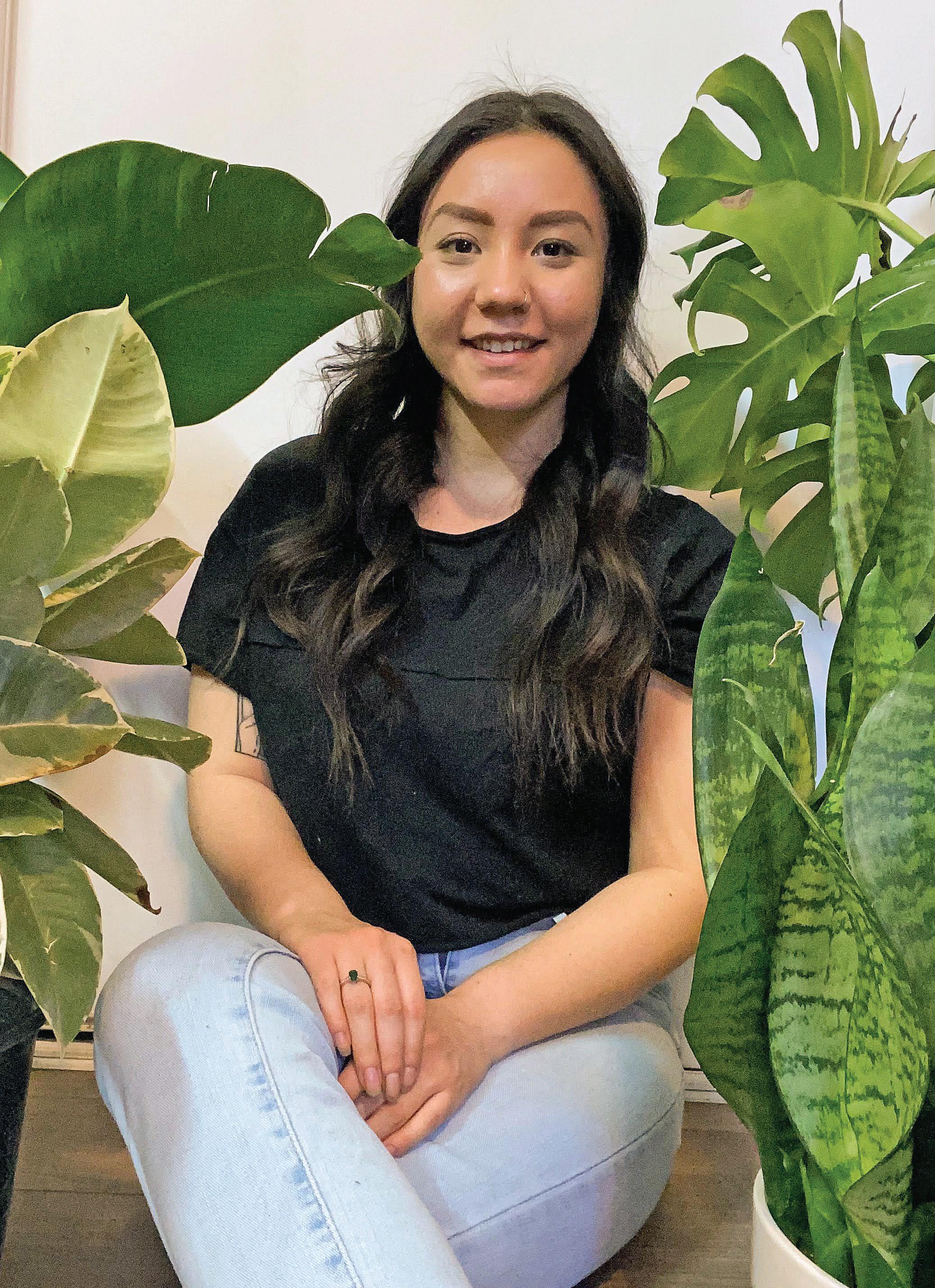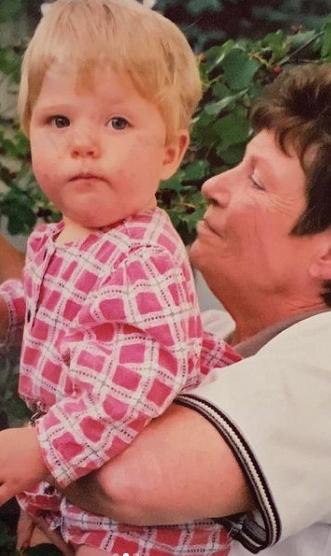
12 minute read
Memorial tattoos help to cope with
LIFESTYLE Inked in grief
How memorial tattoos have become a trendy way to commemorate lost loved ones: art and memories come together to help individuals cope with loss MADASYN KOST mkost@cjournal.ca
Advertisement
It’s a guarantee that you will experience loss in your lifetime. Grief over a loved one can cause pain, sorrow, anger and stress. Isabella Gauvin, who’s only 17, recently got her first memorial tattoo.
A memorial tattoo is exactly what it sounds like. Simply put, it’s a tattoo that represents a person that is no longer alive. Quite often, people choose to get images or items that remind them of their loved ones. It’s also common to have a piece of their handwriting replicated as a tattoo.
Memorial tattoos are becoming increasingly popular. A 2014 study done by psychology student Kaitlyn Burden at Memorial University found that out of 306 participants, 18 per cent reported having a memorial tattoo. The same study (whose respondents were 18 to 75 years old) also found that perceptions of memorial tattoos were more positive than non-memorial tattoos. Memorial tattoos are a way to keep the memories of loved ones alive. Many people believe this type of tattoo helps heal and repair them.
Gauvin, who attends high school here in Calgary, recently lost her great-grandfather Bruno. He meant so much to her and her mother Rainey that the pair decided to get matching tattoos, a first for both of them.
The tattoo, which reads Bello, is a tribute to the nickname he had for the women in his life.
“Right before he passed away he was in a hospice, and he didn’t recognize anyone and couldn’t even open his eyes really, but the last time I saw him he recognized me and he called me Bello,” said Gauvin.
Bello, which means ‘beautiful’ in Italian is something Gauvin remembers her great-grandfather calling her often. Even at the end of his life, that nickname and bond was strong.
She wanted her first tattoo to be meaningful and luckily for her, her mom agreed this was a good choice.
“My mom wasn’t sure about my age, being under 18, but we both agreed that this was something very special to us and she knew that even if we waited a year until I was 18, I would get it anyways,” she said.
The two had a shared appointment when they got their tattoos which provided a nice bonding experience for the mother-daughter duo.
There is no “legal age” to get a tattoo in Alberta however, most tattoo shops require customers to be at least 18. Some shops will allow underage tattooing but many require a parent’s consent.
When deciding where on her body to place the tattoo, Gauvin says she wanted it near her heart which is why she chose to have it done on her ribs. The tattoo itself is black and white, a rose with a stem that reads Bello in soft script.
While she hasn’t had the tattoo for long, Gauvin says she already feels closer to her great-grandfather.
“I had a really hard time after he passed and I still haven’t really gotten over it. But having it with me [the tattoo] just makes me feel like he’s with me more than I already did,” she said.
Memorial tattoos mean something to the artists too
Kaylie Heschel, a tattoo artist at Atticus Tattoo, has been doing memorial tattoos as long as she’s been tattooing which is nearly six years.
“I believe people get tattoos because they want to feel a stronger connection to loved ones, a stronger connection to friends and just help them remember that they’ve lived life, they’ve had adventures,” Heschel said.
In her line of work, Heschel meets new people almost every day and says she loves hearing their stories and helping them create lasting memories of their loved ones.
“It makes me so happy that as a tattoo artist I can give that feeling to someone who’s lost an important part of their family or important friends.”
There are many types of memorial tattoos. Some people pay tribute to their pets, some are for dear friends and others represent a loss of people they may have never even met.
Heschel recalls one of her most emotional memorial tattoos was for a couple who lost their child to miscarriage. The parents gave her a sealed envelope with the baby’s footprints, something they hadn’t even opened themselves yet.
“It was probably the moment I realized how much trust, how much people are putting to me to create something special for them,” Heschel said. “I had to take a moment away from the couple because I got quite teary just looking at the size of these little footprints.”
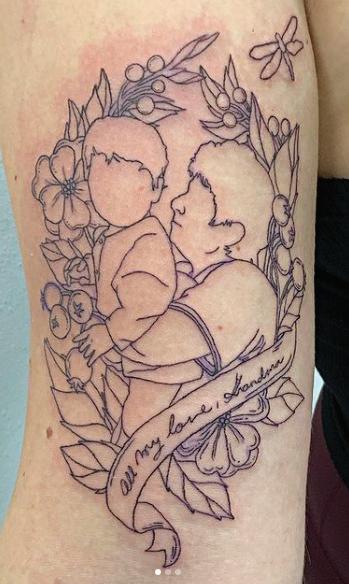
LEFT: photograph of Danielle Schulmeister and her grandmother Heather picking Saskatoon berries off a tree in
her grandmother’s backyard. RIGHT: Tattoo replication of the photograph. PHOTO: COURTESY OF DANIELLE SCHULMEISTER
Kaylie Heschel working on a tattoo at the Calgary Tattoo Festival in 2020.
PHOTO: KAYLIE H.
Isabella Gauvin’s memorial tattoo which reads Bello was done by Kaylie Heschel at Atticus Tattoo in Calgary.
PHOTO: ISABELLA GAUVIN

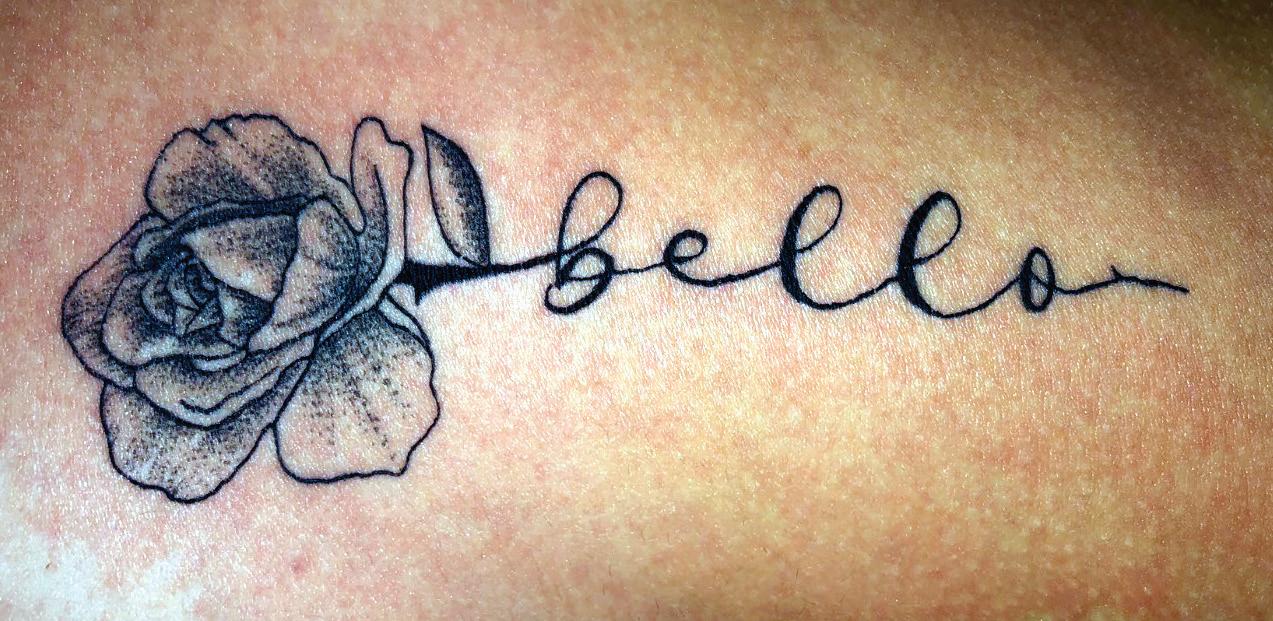
The tattoo itself was the footprints of their baby with wings.
Healing by commemorating
This sort of connection to dead loved ones is what many people are looking for, according to a 2009 master’s thesis study done at Smith College.
“The majority of participants spoke about their tattoos as functioning as tools for connecting with the dead,” wrote Elizabeth Schiffrin, the study author. “Half the participants identifi ed ho w the tattoos have created gateways to talk about their grief experience.
More than half of the study participants said they think of the tatoo as a physical embodiment of their loved one and the same number say they physically “touch,” “rub” or “look at” to embody a connection with the deceased, or when they are in need of “grounding. ”
If you ask people who have memorial tattoos, they’ll tell you that they’re not meant to be sad. In fact, memorial tattoos often bring joy and peace to people who receive them. 12 MAY/JUNE 2021 CALGARYJOURNAL.CA
> Kaylie Heschel
“For some reason when it becomes a tattoo it’s not as sad, it’s more of a happy memory, which I think is something really special that happens,” Heschel said.
Memorial tattoos often tell a story of a loved one, whether it’s a favourite fl ower, a cherished memory or just a simple word that reminds the person of the departed.
“When that gets translated into a tattoo and you look at your tattoo on your arm, there’s a happy feeling, there’s a I’m not alone feeling, there’s a even though she’s gone, I know I’m always loved kind of feeling.”
Every tattoo tells a story
Danielle Schulmeister, 20, a student at Alberta University of the Arts in Calgary, says two of her tattoos are very sentimental. Schulmeister has one of a sea turtle hatchling on her ribs to commemorate her time in Costa Rica, where she volunteered with the Sea Turtle Conservatory.
Her latest tattoo however, serves as a way to keep her grandmother’s memory alive.
“My tattoo is a re-creation photo of my grandma and myself, when I was one in her backyard, picking Saskatoon berries off her tree. That photo just evokes a very strong memory of her to me.”
Schulmeister decided to get her tattoo on her right bicep where she could see it.
A lot of people are frightened by the permanence of tattoos, but Schulmeister says she chose a tattoo for that very reason.
“What I like about it is, it’s more permanent than a photo because as we go into this new century, physical photos are going to start becoming obsolete. Those probably won’t last forever; this thing will,” she said.
Sadly, Schulmeister’s other grandmother also passed away this year, and she is planning on getting a memorial tattoo for her as well.
She says she’s thinking of getting a piece done with her grandmother’s favourite fl owers as well as her mom’s. Something special that will connect her to her family forever.
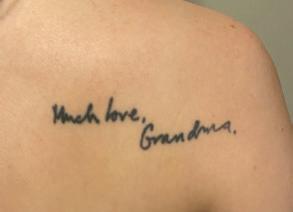
Brogan Mueller’s tattoo of her grandmother’s handwriting done by Calgary tattoo artist Stephanie Speer.
PHOTO: MADASYN KOST
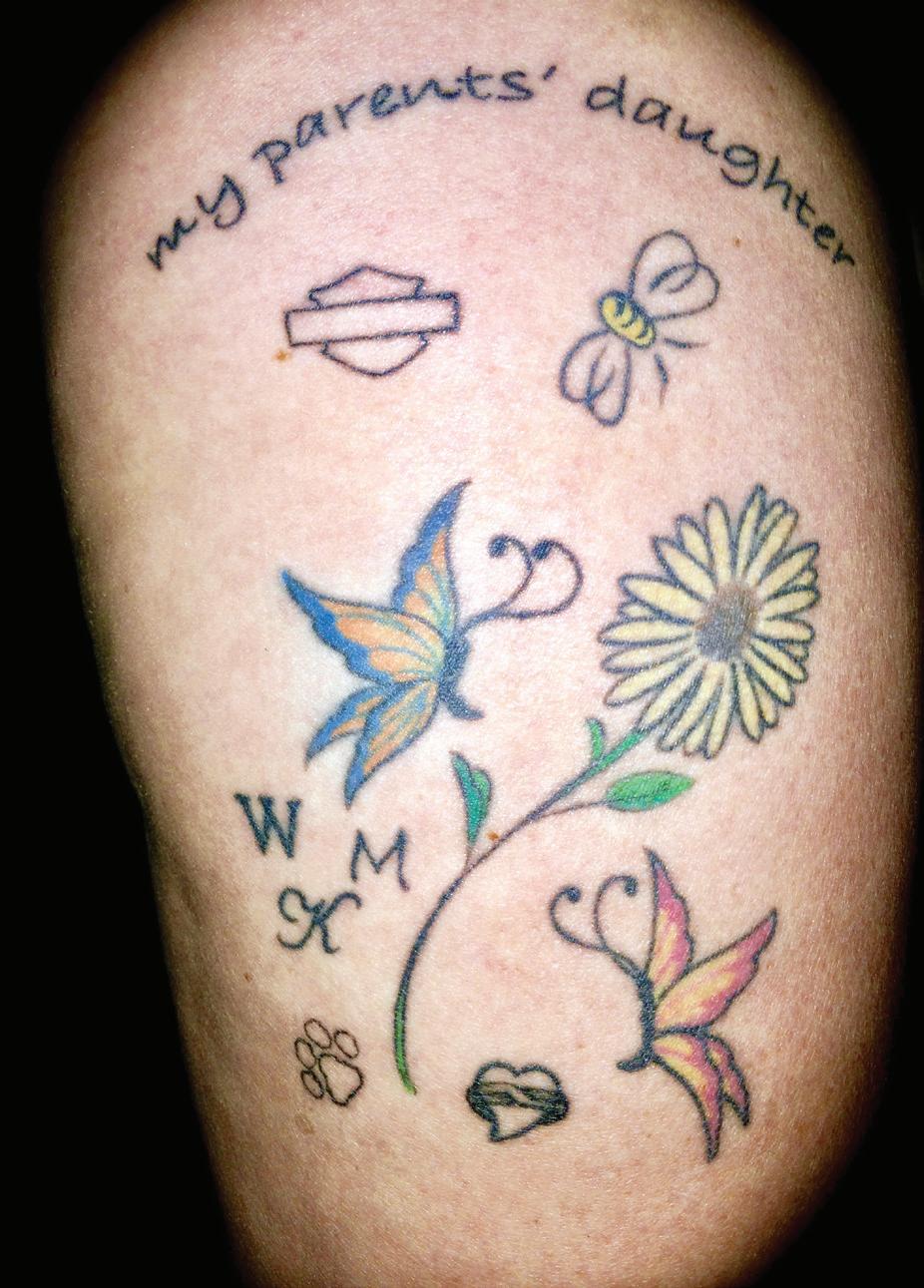
Deborah Davidson’s memorial tattoo in honour of her two babies (pictured as butterfl ies) and other family
members. PHOTO: COURTESY OF DEBORAH DAVIDSON
>Deborah Davidson
Deborah Davidson, a professor of sociology at York University in Toronto, has been researching memorial tattoos since 2009.
She was working with bereaved families of Ontario when she discovered that many of the people she was getting to know had memorial tattoos, most of which she said were people she wouldn’t have expected to have tattoos.
“I noticed the people that I thought weren’t likely to have tattoos based on my biases and my stigmatizing with people with tattoos did have tattoos, did have tattoos in memory of their loved ones,” said Davidson.
She says her research has shown that memorial tattoos are an excellent way to keep our bonds with lost loved ones.
“When people ask us about our tattoos, we not only continue our bonds with them, but we share our bonds with other people.”
It’s not uncommon for people to get memorial tattoos to serve as a reminder of what happened to the people they’ve lost.
After the 2018 Humboldt Broncos bus crash, many of the survivors got tattoos to pay tribute to the 16 people who died. Broncos player Tyler Smith of Leduc, Alta., got 16 birds tattooed on his left shoulder blade to honour those who died.
Davidson created The Tattoo Project, a website that discusses the research behind memorial tattoos. It also looks at trauma tattoos and how tattoos seem to help the healing process in victims as well. The website also serves as a place to showcase memorial tattoos and share stories of love, loss and healing among people.
When Davidson began her research back in 2009, she had no tattoos, but as her work continued, so did her appreciation for them. Along the way she began getting her own memorial tattoos.
Davidson says her tattoo is for her two babies who died shortly after birth [represented by the butterflies], which grew to visual representations of other family members, both deceased and living.
“The name Deborah comes from the Hebrew meaning ‘bee.’ The bee among the other images represents me looking over my family,” she said.
Davidson also has an elephant tattoo to commemorate her time working on the project.
“The tattoo that’s the logo for The Tattoo Project, the elephant tattoo is actually tattooed on my arm as well. As commemorating the tattoo project and commemorating my research and my relationship to this kind of work,” said Davidson.
Memorial tattoos are often well thought out and are very specific to an individual. Based on Davidson’s research, regret is rarely an issue for people.
“Some people have said, you know, thinking about it later I might have done it like this or I might have done it like that. You know I’ve added to it, but no one has ever regretted the decision,” she said.
The number of tattooed people is increasing
A 2012 Ipsos poll showed that 22 per cent of Canadians had at least one tattoo on their body, and the numbers are even higher for women and young people.
The evolution of tattoos, a timeline
Brogan Mueller, 27, a manager at MNP, got her first tattoo at the age of 25. She says she wanted her first tattoo to be special, something meaningful.
Mueller visited her grandmother over summer break while growing up.
“All my summers, me and my brother would always go to Vancouver Island and spend so much time with my grandma, she was so involved and that really shaped how we grew up,” said Mueller. ueller says her grandmother always wrote letters to her growing up; it was their main communication.
“She would always send things in the mail. Anything she was doing, she’d always write a letter or anywhere she travelled we’d always get postcards from her,” she said.
Every letter always ends the same way, reading, Much Love, Grandma.
So what better way to honour her grandmother than to get those three little words tattooed on her forever?
While Mueller’s grandmother is still alive, she is dealing with multiple health issues.
Mueller says the tattoo is very important to her and she’s extremely happy to have a piece of her grandmother on her forever.
Jonathan Delorme, 27 had a rough 2016. In January he lost a childhood friend to cancer, several months later he lost another friend to suicide and at the end of the year his father passed away.
Delorme said he really struggled with the passing of his friend Dylan which led him to get a memorial tattoo to honour him.
He said at first the decision was really based on guilt and regret.
“He was diagnosed in August and then after that, I didn’t go see him in the hospital while he was sick. I was just busy with school and life, and then all of a sudden I got the call,” said Delorme.
Now, almost four years later, he says his tattoo helps him through his grief and allows him to remember his friend daily.
“There’s not a day that goes by that I don’t see that thing on my arm. I also think it’s a reminder to just keep people close and take time for people,” said Delorme. “As for the grieving process it definitely helps, it almost feels like he’s a part of me just because I have his name there.”
When Delorme’s father David died later that year, it was a tough blow. He had spent months taking him to cancer treatments, sitting at his bedside. Since he already had a memorial tattoo for Dylan, Delorme knew he wanted something to pay tribute to his father’s memory.
He chose to get a wolf which was his dad’s favourite animal, on his chest, where he could see it every day.
Memorial tattoos come in all shapes and sizes, from silly cartoons that remind people of their loved one’s favourite TV shows, to paw prints from furry family members.
While some tattoos are more detailed than others, they all start and end with the same goal: To heal, to cherish and to keep loved ones close to our hearts.
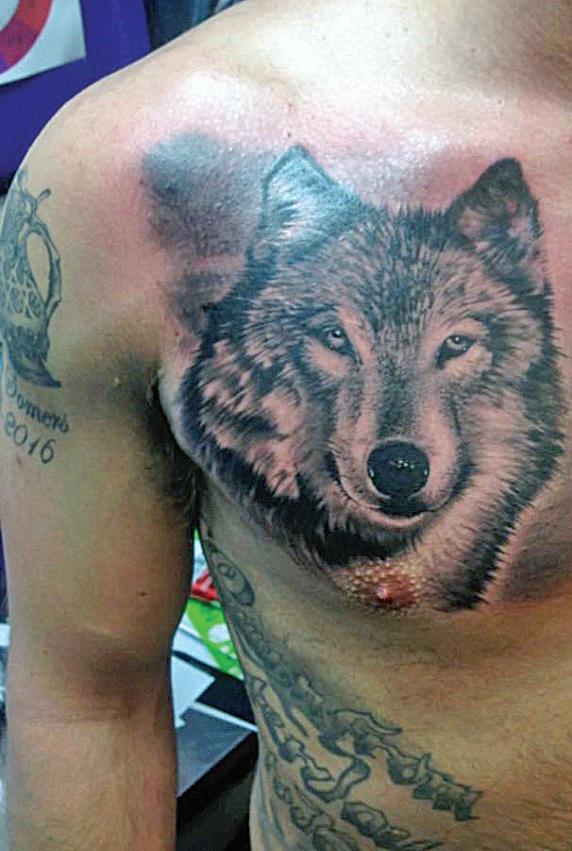
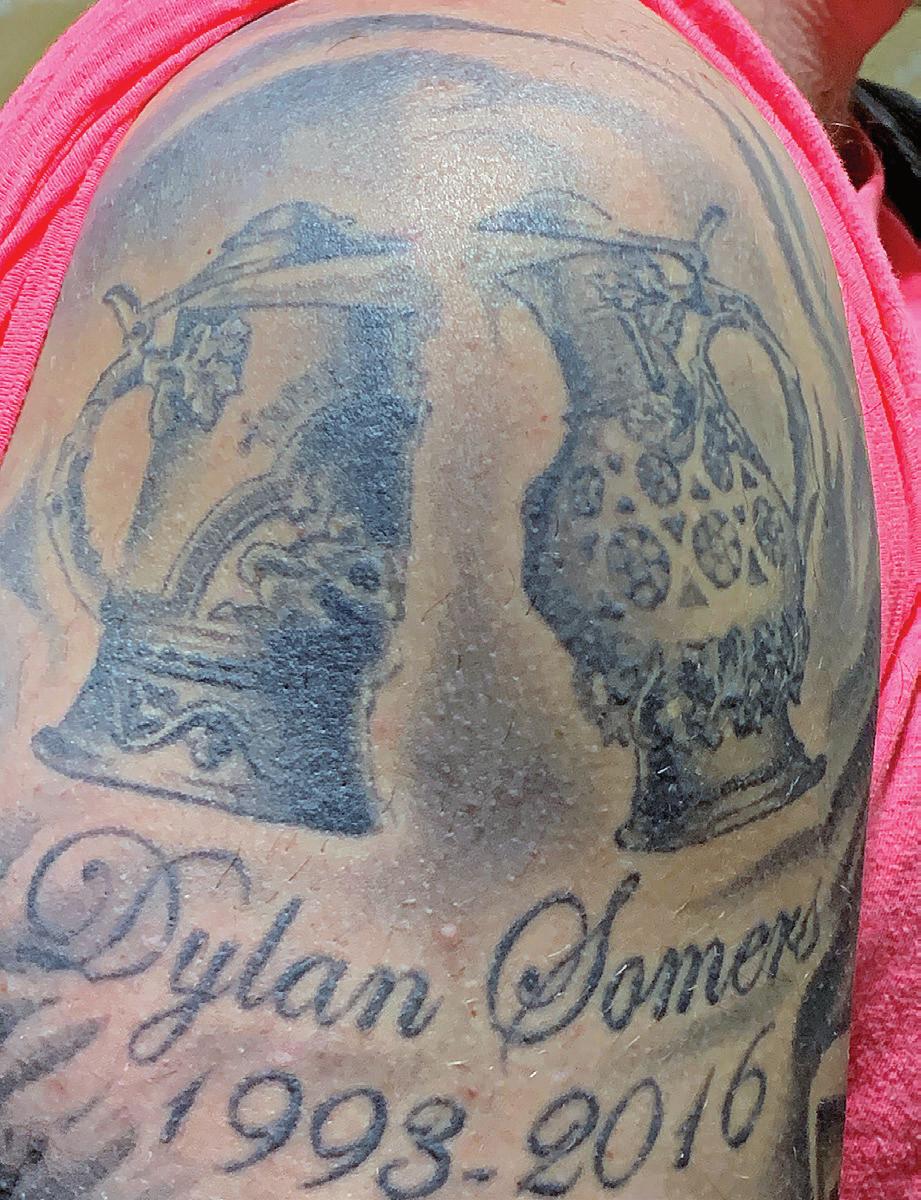
Jonathan Delorme’s wolf tattoo that he got for his father. Jonathan Delorme’s memorial tattoo for friend Dylan Somers. Two steins cheersing in commemoration. Both tattoos were done by Roland Owec at 3DE Tattoo.
PHOTOS: COURTESY OF JONATHAN DELORME



